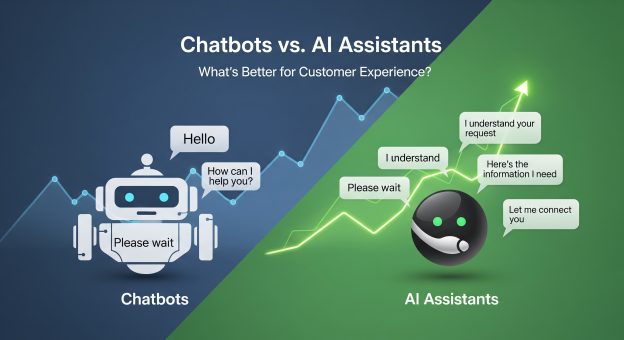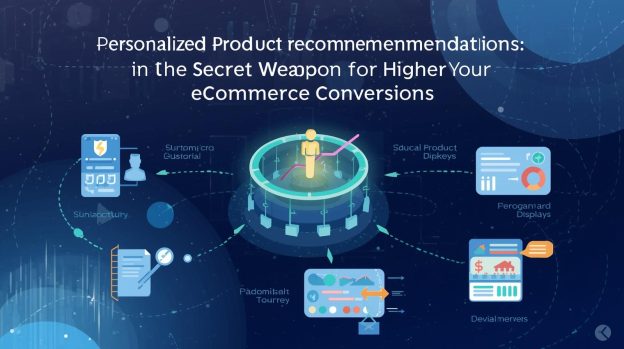Chatbots vs. AI Assistants: What’s Better for Customer Experience?

Before choosing which AI agent is better for your business, you must first understand what they do. AI assistants and AI chatbots are two distinct AI applications. They are widely adopted in industries each having their own benefits and features.
AI is definitely taking organisations towards achieving operational excellence. App development companies develop AI-first mobile apps as they facilitate automation, efficiency and personalisation that helps businesses facilitate better customer experience. Let’s dive into understanding what works for your business and how –
Let’s Understand What AI Chatbots Are
AI Chatbots are an artificial intelligence application which uses natural language processing for simulating human-like conversations. AI chatbots can interact with users effectively through chat boxes or conversational interfaces. AI Chatbots can handle increasingly demanding tasks and high volume conversations which is a necessity in the customer service industry.
Key Technologies Used in Building AI Chatbots
The capabilities and features of each AI chatbot depends on how they are built. Vendors design conversational AI chatbot according to the needs and demand of specific business environments.
- The primary technologies used in building conversational AI chatbots include natural language processing, natural language understanding and machine learning.
- AI can effectively translate human language using natural language processing (NLP) so that they can form a reply.
- Natural language understanding can help AI chatbots interpret the intent of the users. They can very well understand the context of the conversation and make interactions that are more human-like and accurate.
- Conversational AI chatbots use machine learning through which they can learn from past interactions, recognise patterns and respond to users for their complex queries.
Key Features and Capabilities of AI Chatbots
- The conversational AI chatbots can effectively perform task automation. They can complete tasks like resetting passwords, updating billing addresses, etc without requiring any human assistance.
- AI chatbots are built with efficient context management support. AI chatbots can understand your queries or unresolved issues from the past without the need of repeating the situation.
- Some AI chatbots have multilingual assistance. They can support customers in resolving issues in different languages.
- AI chatbots are efficient in sentiment analysis. They can understand and recognise patterns in digital text that helps them determine the mood of the user. It helps them understand the context of the conversation and are intelligent enough to escalate the case to let a human assistant take over.
- AI improves user experience. You can implement AI chatbots across channels to ensure that you deliver a consistent user experience. Your customers may send queries on various channels, be it mobile apps, social media platforms, or company websites. You can integrate AI chatbots across various platforms to assist customers timely and adequately.
Now Let’s See What AI Assistants Do
AI virtual assistant is also an artificial intelligence application which uses AI, conversational interfaces and natural language processing to provide information to users and perform a variety of tasks.
AI assistants can be viewed as your “Digital Buddy” who makes your life easier. If you ever used your smart device to turn on the AC, set an alarm or find a recipe, you have used a virtual assistant.
For example, AI agents like Alexa and Gemini help you perform simple tasks through your smart phone device. Now imagine if you integrate such virtual assistants in the workplace. They can help you evaluate large amounts of data, schedule meetings, interpret patterns in your sales report and even decide the next steps of your marketing campaign.
There are different forms and shapes of AI assistants just like conversational chatbots. They act as specialised agents through which you can automate various effort taking and time taking tasks in your workplace.
Which of These AI Assistants Are You Familiar With?
- There are generalised AI assistants which can help you coordinate your entire day by managing reminders, alarms, emails, calendars, etc. Generalised AI assistants can understand your behaviour and preferences based on which they can suggest ideal actions. For instance, smart devices have speech activated assistants which help you monitor upcoming events.
- There are task specific AI assistants who manage specialised workflows such as for sales, marketing, finance, HR, etc. You can integrate task specific assistants in your systems to enhance operational efficiency. You will not need to switch between different platforms constantly. For instance, you can integrate a digital assistant with an existing CRM system through which you can automate follow-up emails, scoring new leads and reporting.
- There are collaborative AI assistants who can assist you in finding information quickly. You will not need to search for information within files, emails, conversations, etc. You can raise queries on AI conversational interface and get accurate and context-specific answers. For instance, generative AI tools like ChatGPT and Copilot can assist you in conducting research and provide sources before you present these details in the meeting. In addition, the collaborative AI assistants can summarise the conversations in a meeting to give you a gist of all the important points.
- There are autonomous AI agents who can complete tasks independently by interacting and learning from its environment. Autonomous AI agents are highly goal-oriented who can execute tasks and achieve objectives independently without requiring any human guidance.
Key Features and Capabilities of AI Assistants: How Are They Different From AI Chatbots
- AI virtual assistants can learn user preferences and patterns effectively through which they improve overall task management and provide proactive support. For example, AI virtual assistants use machine learning to understand patterns and analyse user preferences.
- With time, AI assistants can learn if a user prefers email alerts over calendar notifications.
- Virtual assistants can understand the context, problem and tone of the user more proactively. AI assistants can suggest actions depending on current user needs.
- AI chatbots are built into the specific website, software or application, but AI assistants can assist users across all integrated platforms.
- The adaptability of AI assistants is more effective as compared to the AI chatbots. It means that AI assistants can recall conversation details and adjust their responses to feel more human-like and natural which is a limitation in AI chatbots.
What Do You Need For Your Business – AI Assistants or AI Chatbots?
The selection of one over the other depends on your business needs and operational goals. For instance, chatbots are well equipped in providing customer support. They can handle customer queries and routing issues effectively. For internal team productivity, AI assistants will be a more viable choice as they can effectively manage the workload and manage communications in the workplace.
For live site support, chatbots are a more suitable option. AI chatbots can efficiently engage in interactions with the users and website visitors. They can handle their queries to resolve common issues proactively. For effective email management, you can employ AI assistants and integrate them with your email platforms to effectively handle email marketing workload.
To Sum Up
You can build autonomousAi assistants and chatbots to meet the specific needs of your business. Our developers at VerveLogic, a leading mobile app development company in california, excel at integrating AI features into existing software, systems and applications. For your website or app development needs using AI, you can consult our team to know how AI integration can improve your operational efficiency.



